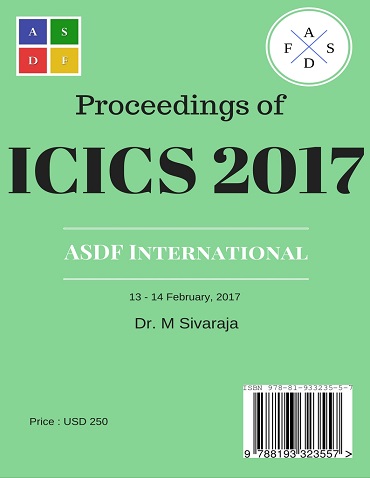- Publication Meta:Value
- Short Title:ICICS 2017
- Publisher:ASDF, India
- ISBN 13:978-81-933235-5-7
- ISBN 10:81-933235-5-6
- Language:English
- Type:Hard Bound - Printed Book
- Copyrights:ICICS Organizers / DCRC, London, UK
- Editor-in-Chief:Dr M Sivaraja
- Conference Dates:13 - 14, February 2017
- Venue Country:Karur, India
- Submitted Papers:456
- Acceptance Rate:8.08%
- Website:www.icics.asia
Welcome to ASDF Electronic Digital Library!
ICICS 2017
ICICS 2017
International Conference on Intelligent Computing and Systems 2017
Paper 026
Effect of Fruit Waste and Yard Waste Using Water and Industrial Effluents in Vermicomposting Technology
Mohanasundari Somasundaram1, Hemapriya Subramanian2
1Sri Muthukumaran Institute of Technology, India
2NSN College of Engineering and Technology, India
Abstract
Due to the phenomenal growth in the quantum and diversity of the waste materials generated by the human activity, potentially harmful effects on the environment and public health are resulted. The present method of the waste disposal causes the pollution of soil as well as the surface and ground water. Hence vermicomposting is carried out as a safe method for solid waste disposal. An experiment is conducted to prepare vermicompost using partially decomposed fruit waste and yard waste by employing indigenous earthworm species. The earthworms used are Eudrillus Eugenie. This process is carried out with the use of diluted raw dairy and distillery effluents to provide the necessary moisture for the wastes. The process is done under the controlled conditions of pH, moisture content and temperature. In this process partially decomposed fruit and yard waste are broken down and fragmented rapidly by earthworms, resulting in a stable non-toxic material with good structure which has a potentially high economic value as soil conditioner for plant growth. Within 40 days, the castings obtained on the top surface are collected, sieved, dried, tested and used as manure. The result reveals in the increased nutrient content, increased worm population and decreased processing days of the waste in the order of: Dairy, Distillery and water. Hence this study shows that the vermicomposting is an efficient process that stabilizes the waste, at the same time managing to solve the environmental problems arising from their disposal.
Keywords
Author's Profile
Author profile can be generated and linked through our partners World Book of Researchers. To include your profile online Click Here. After it is approved, please email to edlib @ asdf.res.in to create a link with all the papers.
e-AID
ICICS.2017.026
Cite this Article as Follows
Mohanasundari Somasundaram, Hemapriya Subramanian. "Effect of Fruit Waste and Yard Waste Using Water and Industrial Effluents in Vermicomposting Technology." International Conference on Intelligent Computing and Systems (2017): 13. Print.
© 2010 - by EDLIB .
All Rights Reserved.

